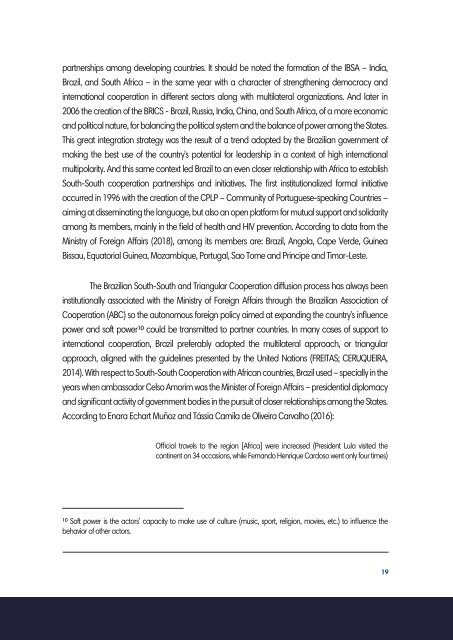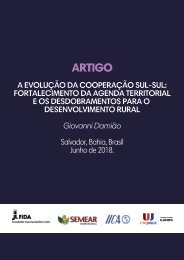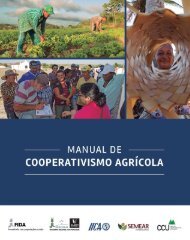The Evolution of South-South Cooperation
Since the Bandung Conference in 1955, the countries of the South have organized themselves in a structured way to achieve better levels of development. This article aims to present the evolution and recent trends of South-South Cooperation, showing how the historical dynamics have led the United Nations and its agencies to adopt a territorial approach, with a strong appeal to mobilize local actors. Allied to this, the increase of the independence of the actors that, with autonomy, manage to dialogue and conduct initiatives of cooperation outside the formal sphere of the central government. This article also aims to present rural development, agriculture and food security as essential factors for the development that since 1978, with BAPA (Buenos Aires Plan of Action), is one of the main thematic lines presented when it comes to the development of the southern agenda. Alongside this, the challenges presented by the prioritization of market dynamics in the face of social development, and how some of the multilateral agencies have worked to promote the facilitation of South-South cooperation and empowerment of minorities, in the achievement of governance as a strategy for endogenous and localized development
Since the Bandung Conference in 1955, the countries of the South have organized themselves in a structured way to achieve better levels of development. This article aims to present the evolution and recent trends of South-South Cooperation, showing how the historical dynamics have led the United Nations and its agencies to adopt a territorial approach, with a strong appeal to mobilize local actors.
Allied to this, the increase of the independence of the actors that, with autonomy, manage to dialogue and conduct initiatives of cooperation outside the formal sphere of the central government. This article also aims to present rural development, agriculture and food security as essential factors for the development that since 1978, with BAPA (Buenos Aires Plan of Action), is one of the main thematic lines presented when it comes to the development of the southern agenda. Alongside this, the challenges presented by the prioritization of market dynamics in the face of social development, and how some of the multilateral agencies have worked to promote the facilitation of South-South cooperation and empowerment of minorities, in the achievement of governance as a strategy for endogenous and localized development
You also want an ePaper? Increase the reach of your titles
YUMPU automatically turns print PDFs into web optimized ePapers that Google loves.
partnerships among developing countries. It should be noted the formation <strong>of</strong> the IBSA – India,<br />
Brazil, and <strong>South</strong> Africa – in the same year with a character <strong>of</strong> strengthening democracy and<br />
international cooperation in different sectors along with multilateral organizations. And later in<br />
2006 the creation <strong>of</strong> the BRICS - Brazil, Russia, India, China, and <strong>South</strong> Africa, <strong>of</strong> a more economic<br />
and political nature, for balancing the political system and the balance <strong>of</strong> power among the States.<br />
This great integration strategy was the result <strong>of</strong> a trend adopted by the Brazilian government <strong>of</strong><br />
making the best use <strong>of</strong> the country's potential for leadership in a context <strong>of</strong> high international<br />
multipolarity. And this same context led Brazil to an even closer relationship with Africa to establish<br />
<strong>South</strong>-<strong>South</strong> cooperation partnerships and initiatives. <strong>The</strong> first institutionalized formal initiative<br />
occurred in 1996 with the creation <strong>of</strong> the CPLP – Community <strong>of</strong> Portuguese-speaking Countries –<br />
aiming at disseminating the language, but also an open platform for mutual support and solidarity<br />
among its members, mainly in the field <strong>of</strong> health and HIV prevention. According to data from the<br />
Ministry <strong>of</strong> Foreign Affairs (2018), among its members are: Brazil, Angola, Cape Verde, Guinea<br />
Bissau, Equatorial Guinea, Mozambique, Portugal, Sao Tome and Principe and Timor-Leste.<br />
<strong>The</strong> Brazilian <strong>South</strong>-<strong>South</strong> and Triangular <strong>Cooperation</strong> diffusion process has always been<br />
institutionally associated with the Ministry <strong>of</strong> Foreign Affairs through the Brazilian Association <strong>of</strong><br />
<strong>Cooperation</strong> (ABC) so the autonomous foreign policy aimed at expanding the country's influence<br />
power and s<strong>of</strong>t power10 could be transmitted to partner countries. In many cases <strong>of</strong> support to<br />
international cooperation, Brazil preferably adopted the multilateral approach, or triangular<br />
approach, aligned with the guidelines presented by the United Nations (FREITAS; CERUQUEIRA,<br />
2014). With respect to <strong>South</strong>-<strong>South</strong> <strong>Cooperation</strong> with African countries, Brazil used – specially in the<br />
years when ambassador Celso Amorim was the Minister <strong>of</strong> Foreign Affairs – presidential diplomacy<br />
and significant activity <strong>of</strong> government bodies in the pursuit <strong>of</strong> closer relationships among the States.<br />
According to Enara Echart Muñoz and Tássia Camila de Oliveira Carvalho (2016):<br />
Official travels to the region [Africa] were increased (President Lula visited the<br />
continent on 34 occasions, while Fernando Henrique Cardoso went only four times)<br />
10 S<strong>of</strong>t power is the actors’ capacity to make use <strong>of</strong> culture (music, sport, religion, movies, etc.) to influence the<br />
behavior <strong>of</strong> other actors.<br />
19




